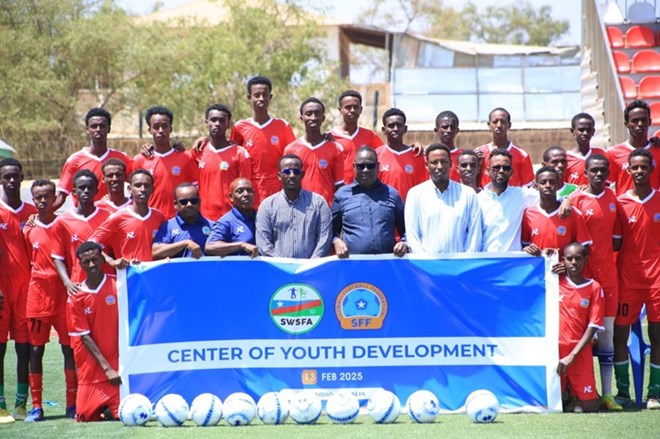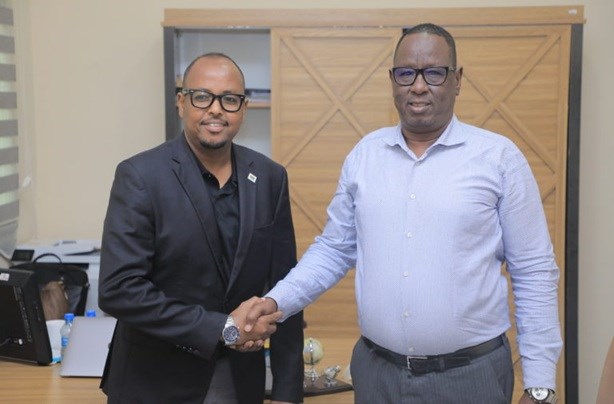
Friday February 14, 2025

Players, coaches, and officials gather at the official launch of Somalia’s first Youth Football Development Center in Baidoa on February 13, 2025, a milestone in the Somali Football Federation’s grassroots initiative. (Photo courtesy of SFF/SWSFA)
Mogadishu (HOL) — Somalia’s footballing ambitions took a major leap forward this week with the launch of the country’s first Youth Football Development Center in Baidoa, marking a significant investment in grassroots infrastructure. The initiative, spearheaded by the Somali Football Federation (SFF), aims to establish similar centers nationwide to nurture young talent and create a pathway to professional football.
Baidoa, 246 kilometres southwest of Mogadishu, has been chosen as the first step in a broader footballing blueprint. The center will train players aged under-9 to under-16, incorporating structured football education alongside formal schooling.
“To develop competitive footballers, we must invest in young players early,” said SFF President Ali Abdi Mohamed at the opening ceremony. “This center is not just about football; it’s about shaping well-rounded individuals.”
The SFF intends to roll out similar academies across all federal member states, with Baidoa serving as a prototype for the national football development project. In addition to nurturing young talent, the federation has also launched a CAF License D coaching course for 30 young coaches, ensuring that football education is reinforced with qualified instructors.
“The foundation of great football lies in proper coaching,” said Ahmed Ali Hassan, chairman of the South West State Football Association. “This course will ensure that every region develops skilled coaches who can mentor young players effectively.”
The SFF is also taking steps to reconcile leadership. In a move aimed at bridging past rivalries, Mohamed has appointed his former election opponent, Wiish Yabarow, as chairman of the SFF Referee Committee.
Yabarow, a former international referee, had previously led the referee department before resigning in 2022 to contest the SFF presidency. His legal battle against Mohamed’s election victory even reached the Court of Arbitration for Sport, where he lost the appeal. His return to leadership suggests a shift toward unity within Somali football’s governing body.

Somali Football Federation (SFF) President Ali Abdi Mohamed (R) shakes hands with newly appointed Referees Committee Chairman Wiish Yabarow (L), signalling a move towards unity and leadership stability within Somali football. (Photo by Abdulkadir Muse Osman)
“Football thrives on competition, but respect and collaboration must follow,” Mohamed said. “On the pitch, teams fight for 90 minutes, but they shake hands at the final whistle. We must carry that spirit into our leadership as well.”
The SSF hopes Yabarow’s appointment can bring reform and structure to the refereeing system, an area that has long struggled with inconsistency. His experience as a referee and administrator could help professionalize officiating in domestic competitions, strengthening the credibility of Somali football at a national level.
As youth academies take shape, Somalia’s U-17 national team is already making strides on the international stage as they prepare for the TotalEnergies CAF Under-17 Africa Cup of Nations (AFCON), which will run from March 30 to April 19 in Morocco. The Ocean Stars, which qualified by finishing third in the CECAFA U-17 Zonal Qualifiers, will be making their second consecutive appearance at AFCON.
A strong performance in Morocco 2025 would put Somalia on the brink of an even greater milestone: qualification for the FIFA U-17 World Cup in Qatar, where a record 10 African teams will compete from November 5-27, 2025.
Somali football still faces challenges. Years of instability and lack of infrastructure have hampered growth. However, with a structured approach to youth development and governance reform, the SFF is laying the groundwork for a more competitive and organized football ecosystem.